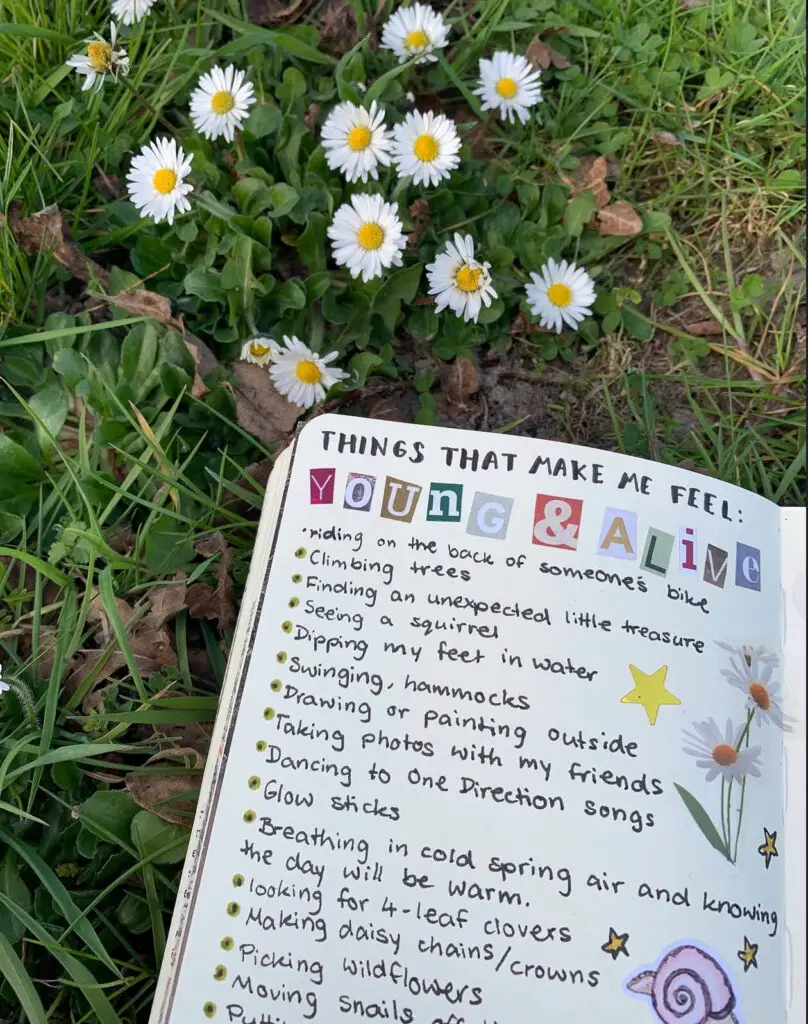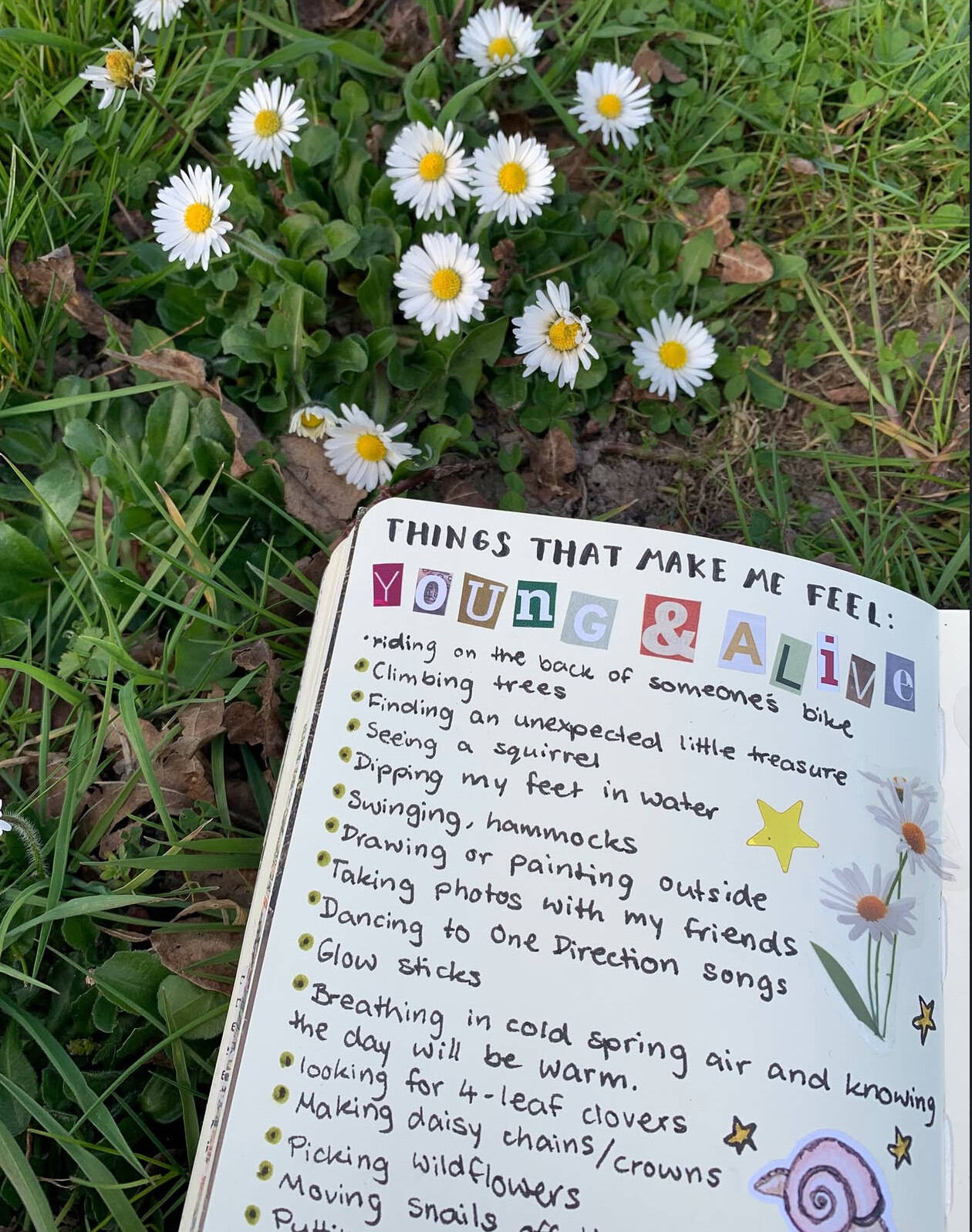Journaling for Self-Improvement: 60 Prompts for Personal Growth
In recent years, especially after COVID first hit, journaling for self-improvement has surged. Across social media, trendy videos of journal entries with posh handwriting and seemingly effortless doodles in color-coordinated pens are circulating.
If you’re anything like me, seeing such aesthetically pleasing entries may have enticed you to start journaling yourself.

Source: Instagram user @doodl3.bug
Honestly, though, these “journal tour” videos may not always be realistic for people who aren’t very artistically inclined. I unfortunately learned this the hard way. After several non-consecutive attempts at curating a pretty page of drawings and neat handwriting, I left the craft, thinking maybe journaling wasn’t for me.
I was just missing one of the main points of journaling, though, which is deeply rooted in mental health and well-being. Artsy journaling is a means of anxiety relief for a lot of people, but I needed something a bit more “traditional.”
Your journal is meant to be a safe space where you can express yourself freely.
Whether that be by creating a picture-perfect, scrapbook-esque diary or a disheveled book of hastily scrawled-out thoughts is completely up to you!
So, if you’ve had a similar experience to mine and feel a bit lost in your journaling journey, search no more – this article is for you.
I’ve written 60 prompts for those of you who may want a more structured approach to journaling to improve mental wellness.
The Power of Journaling for Self-Improvement
No matter how you choose to express yourself in your journal, there are clear benefits that arise from the practice.
A study conducted at the University of Wisconsin La Crosse, examines the effects of journaling on college students, with results exposing that of the surveyed participants, 94.74% claimed that the practice of journaling provided them with at least a little bit of mental relief. So, why exactly is this?
Taking some time to journal about how you’re feeling can reduce anxiety since you’re allowing yourself to open up without the fear of what others may think. Your journal is entirely private and personal to you – it’s a safe space!

Additionally, if you’re a big overthinker (I know I am!), having a physical outlet for your thoughts can be a game-changer. Whenever those anxious tendencies start creeping up on you again, it’s good to have your worries written out so you can look at them more objectively.
Following this logic, engaging in journaling is likely to improve self-awareness. When you have a way to track your feelings over a given period, it’s easy to recognize situations in the past in which you may have acted out of character.
In that sense, though, it’s also easy to recognize emotional and mental progress.
All that being said, it can be daunting trying to figure out where to begin. I mean, I’ve got so many thoughts flying around my brain daily. How do I choose what to write about first?
That’s why it can be helpful to choose a prompt to follow. Whether you want to write about accomplishing a professional goal or preparing for a stressful conversation, having a prompt can help guide you through your thoughts on the topic.
How to Start Journaling for Self-Improvement
Before picking a prompt, though, you’ve got to make sure you have the most important element of journaling at your disposal; that is to say, an actual journal.
A typical pen-and-paper type journal could be best for you, or a note-taking app on a phone or computer may be your cup of tea. All that matters is that you choose whatever medium feels most comfortable for you.

Set aside specific time in your schedule for journaling.
Developing habits can be hard, but by staying consistent with a practice, it’s more likely to become second nature.
For me, the best time to journal is before bed when I’m comfortable and alone with my favorite music and my thoughts. However, it’s totally up to you – you may want to try out some different places and times and see what makes you feel the most ready to write.
This next point might be the most important, at least in my eyes. I know it’s easy to feel dejected when it seems like you aren’t immediately gaining anything from journaling. You just need to remember that reaping the benefits takes time. Take some baby steps and get comfortable in your private, written safe space. As time goes on, it’ll only get easier to write honestly and in a way that provides for self-reflection and growth.
Since it can be hard to get the “important thoughts” flowing sometimes, try going into each journaling session with a specific theme or topic you may want to explore more. I’ll be listing some prompts shortly that fall under particular topic umbrellas, just so you have a variety of places to start.
And finally, I know you’re busy. It’s hard not to be in this day and age. But, give yourself some grace. It’s important to practice mindfulness in order to evade anxiety and overthinking, and journaling helps with this!

Source: Instagram user @jonnastudio
60 Journaling Prompts for Self-Improvement
60 is a big number, so to keep overwhelmedness at a low, I’m dividing the following prompts into different subcategories, including self-reflection, gratitude, goal-setting, mindfulness and awareness, emotional exploration, and personal growth.
Self-reflection:
– List your greatest attributes.
– Write out 5 things that make you the happiest.
– What is a belief or value that you live by?
– Name your biggest fear, and why.
– What is your go-to coping mechanism for when you don’t feel your best? – What are your biggest weaknesses, and how can you work to either improve or accept them?
– How do you interpret and practice self-care?
– What is something that has changed in your life recently? How did you handle that change?
– Do you self-isolate? How can you work to change that, if necessary? – What makes you feel energized?
Gratitude Journaling For Self-Improvement:
– What are five things you’re grateful for today?
– Who is your biggest inspiration and why?
– What is something positive that happened in your past that has shaped you into who you are today?
– Name your biggest accomplishment to date.
– What is the biggest source of joy in your life?
– What are four things you love about yourself?
– List five small things about life that make you happy
– Which kinds of environments make you feel the safest?
– Who is someone you admire, and in what ways are you similar to them? – List three things that you couldn’t live without.

Source: Instagram user @liliandaisyjournals
Goal-Setting Journaling for Self-Improvement:
– List one personal, academic, and professional goal you have for this year. – Write out a list of steps you can take to reach a goal of yours.
– Where do you see yourself in a year from now, and what steps can you take to be that person?
– Write out a bucket list.
– What is a topic you would like to learn more about and why?
– What motivates you to achieve your goals?
– Write out one thing you want to be remembered for.
– Is there anyone in your life who can help you reach one or many of your goals? How so? – What are some of your biggest strengths, and how can these be useful in accomplishing your goals?
– Think of a time you accomplished a goal in the past. Can you apply any of the steps you took back then to a goal you are working towards now?
Mindfulness and Awareness:
– Think of a recent time you felt happy and describe the situation with details involving all five of your senses.
– What are five things you can observe right now? Describe them in detail. – What’s something that made you smile today?
– What is the biggest trigger for anxiety in your life? How do you handle this? – Close your eyes and imagine your “happy place.” Where are you?
– How does your life feel when you actively avoid going on your phone in comparison to when you use it regularly?
– When you push yourself out of your comfort zone, how do you feel?
– When something makes you feel upset, how do you confront your feelings? – In what ways do you engage in healthy communication with your loved ones? – When you are unable to fall asleep at night, what do you tend to think about?

Source: Instagram user @mimispostbox
Emotional Exploration:
– Walk yourself through your day and write a log of all the emotions you felt. – Do you tend to lash out at people or withhold your feelings? Can you explain why? – How do you feel at this exact moment?
– How often do you feel happy? What about sad? Angry?
– In which environments do you feel the happiest?
– How does anxiety manifest itself within you?
– How have your relationships been impacted by the way you tend to regulate your emotions?
– What is one thing you need to let go of?
– When other people let their emotions get out of hand, how can you help them reel it back in?
– When was the last time you cried? What was the reason?
Personal Growth:
– What are some good habits you would like to form in your life?
– Are there any parts of your life you think you can improve? How? – Think about who you were this time last year. How have you changed? How different do you expect to be in a year from now?
– What is one way you could impact a loved one’s life within the next week? – What are some bad habits you currently have? What steps can you take to get rid of them?
– What are three new activities you could do in the next month?
– How often do you make things more complicated/challenging than they are? – How do you engage in constructive self-criticism without solely beating yourself down? – What is something you are currently averse to? Are you willing to try it out? – What is something you’ve been worrying about that will be irrelevant in the next month? How can you start to break away from these types of anxieties?

Techniques to Enhance Your Journaling for Self-Improvement
Besides following prompts to provide some structure to your entries, here are a few more tips you might want to follow to maximize your journaling efforts.
Stream of consciousness writing, for example, is a personal favorite of mine. Write down whatever immediately comes to mind without thinking about content, grammar, or structure. It will be chaotic – some of my stream of consciousness entries I still can’t decode. However, reading back through your words, you’ll find that you may have unintentionally revealed something rather profound in your supposed gibberish.
If you’re especially short on time, try the 5-minute journal. Choose three prompts relating to gratitude, goals, and reflections, and each day for five minutes, quickly write an entry responding to each prompt. With this method, you’ll wind up with a concise documentation of your mindset and aspirations over time.
If you feel unsatisfied with the amount of depth you’ve gone into in your journal entries, attempt the “why” technique. Whenever you answer a prompt, ask yourself why you answered the way you did. By continuously asking why you may feel or act a certain way, you are more likely to find a sense of closure and understanding throughout your journaling activities.

For times when you feel anxious or unsure about your future, try visualization journaling, in which you elaborate on certain goals or lifestyles you hope to attain for yourself. Everyone’s version of success is different. Through visualization journaling, you can create a written moodboard that reflects your unique desires for the future and provides you with a sense of solidarity in your aspirations.
morning pages
A final technique for strengthening your journaling activities is writing “morning pages.” Every morning, first thing when you wake up, grab your journal and write three pages of whatever thoughts seem to pop into your mind. The goal of this method is to be at peace with your thoughts before the day begins, rather than heading into your daily routine with a mind full of anxieties.
By employing any one of these techniques in your journaling, you’re sure to gain that extra bit of reassurance that you may need to get through the day in one piece!
Tips to Stay Consistent with Journaling for Self-Improvement
While following prompts can diminish the dauntingness of journaling and push away the likelihood of writer’s block, it can still be hard to stay consistent with the practice. Try to remember these things next time you feel discouraged or reluctant to jot down an entry at your designated writing time:
First off, make it easy on yourself by starting small. You don’t have to write huge, page-long entries every single time. Sometimes I’m so exhausted that I only write one or two sentences before ending my journaling session for the day. The important thing is that you stick to your
schedule and aim for regularity in the frequency of your journaling rather than the length of each entry.
It’s important to remember that noticeable progress does not happen overnight. If you journal for a few days or weeks, don’t expect your life to change immediately. Mental well-being is not linear, and reaching your future goals takes time. Recognize that you’ve taken an important step by beginning to journal, but don’t set unrealistic expectations for yourself and your progress.

On a day when you may feel like journaling “isn’t working,” per se, try reflecting on your past entries and recognizing how much you’ve grown. If you stay consistent with your writing, you’ll have a timeline of your different stages of improvement conveniently laid out before you.
Finally, just make it enjoyable! Whether that means having an established space and time to journal, decorating your journal with stickers and doodles, or even just doing something as simple as writing your entries with your favorite pen, there are lots of ways you can personalize your journaling experience to ensure that you get as much out of it as you hope to.
Wrap Up
So, hopefully, after reading these tips and tricks, you’re feeling more inspired to embark on your journaling journey.
Remember, there are so many benefits to journaling. Having the opportunity to sort out your thoughts and diminish anxiety, owning a tangible record of your growth, and immersing yourself in a judgment-free, personal space are just a few of the main perks to being a consistent writer in your journal.
Try out a few of the prompts or techniques I’ve listed and see which ones seem to work best for you. See if you can consistently journal for one week, and just stay mindful of your headspace and feelings when you’re writing.
Journaling is a personal practice, so it may take some time to figure out what methods of writing you gain the most value from. Everyone has to start somewhere, though, and I hope I’ve been able to provide you with a solid foundation for your future journal entries!
Of course, this article will always be here with the same 60 prompts in case you ever need a little bit of inspiration for your writing. Just remember, don’t be too hard on yourself.
The fact that you’re reading this article means you’re taking initiative to reach your greatest potential, and that in itself is something to be proud of.
From one journal user to a soon-to-be one, you’ve got this in the bag!
Want to keep in touch? Please follow me on Linkedin.

Frequently Asked Questions
Journaling can help clarify thoughts, reduce stress, improve emotional intelligence, track personal growth, and set meaningful goals. It’s a powerful tool for self-reflection and cultivating greater self-awareness.
There’s no one-size-fits-all answer, but consistency is key. Even journaling for 10–15 minutes a few times a week can yield noticeable results. Start with what feels sustainable and build from there.
That’s exactly where prompts come in. The 60 transformative prompts and techniques in this post are designed to guide your thinking and spark insight, even on days when you feel stuck or uninspired.
No. Journaling is a deeply personal practice. Whether you write longhand, use a digital journal, or bullet point your thoughts, the most important thing is to be honest and intentional in your reflection.
Yes, journaling can be an effective way to process emotions, challenge limiting beliefs, and reframe negative thoughts. Many techniques in this post are specifically designed to support emotional regulation and build resilience.
Plugin designed by RofiTech








